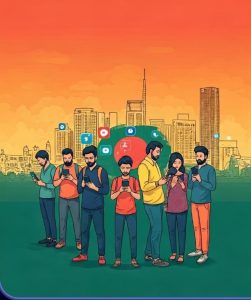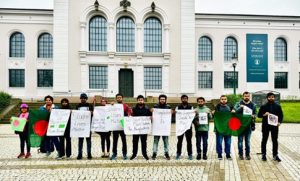Nelufer Nazrul (2024)
In 2024, Bangladesh witnessed a powerful student-led movement that catalyzed democratic change, demonstrating the profound impact of social media on societal transformation. This movement emerged when Bangladesh’s Supreme Court reinstated a controversial job quota, reserving 30% of government jobs for the descendants of heroes from the 1971 Liberation War. Originally abolished by Prime Minister Sheikh Hasina’s administration in 2018, the return of this quota provoked widespread discontent among students who viewed it as limiting equal job opportunities and compromising meritocracy in favor of privilege. Public outcry grew into a full-scale protest, calling for fairness and access to democratic rights (The Diplomat, 2024).
Social media quickly became the movement’s cornerstone, bypassing government-controlled traditional media to enable students to organize, share information, and mobilize. Platforms like Facebook, X (formerly Twitter), and Telegram allowed rapid communication, even under internet blockades and curfews, thanks to VPNs and international journalist support. This digital platform provided students with a direct channel to amplify their democratic demands globally, which forced the government to confront their voices and grievances directly (Reuters Institute, n.d.; Kemp, 2024).
Personal stories on social media added a human dimension that galvanized public support. One particularly moving example was Mir Mugdho, a student shot while aiding others; his story resonated widely, evoking empathy and fueling collective anger. This made it difficult for authorities to downplay the protests, as these personal stories gave the movement a tangible, human face (The National Herald, 2024).
As news spread around the world through foreign media and the Bangladeshi diaspora, internet bans were mostly rendered useless. Reporters from other countries and Bangladesh who had to leave the country covered the protests, which put more pressure on the government to meet political requests (The Daily Star, 2024; The Business Standard, 2024). This change is often called “Alternative Media,” because social media helps people work together and doesn’t follow the rules of traditional media. Students built strong networks on sites like Facebook and Telegram, coming together over political goals that went beyond national lines (Papacharissi, 2014; Reuters Institute, n.d.).
On August 5, millions participated in the historic “Long March to Dhaka,” culminating in the resignation of Prime Minister Hasina. According to BBC News (2024), this protest underscored how social media can transform public dissent into concrete democratic change.
The 2024 student movement in Bangladesh illustrates how digital platforms can empower voices, unify people swiftly, and challenge authoritarianism when traditional media cannot. It stands as a landmark moment, showcasing social media’s potential to foster democratic resilience and inspire collective action.
References
The Daily Star. (2024). BCL unleashes fury on quota protesters. Retrieved from https://www.thedailystar.net/news/bangladesh/crime-justice/news/bcl-unleashes-fury-quota-protesters-3657866
Al Jazeera. (2024). The victory of Bangladesh’s student movement should not surprise anyone. Retrieved from https://www.aljazeera.com/opinions/2024/8/5/the-victory-of-bangladeshs-student-movement-should-not-surprise-anyone
Kemp, S. (2024). Digital 2024: Bangladesh—DataReportal – Global Digital Insights. DataReportal. Retrieved from https://datareportal.com/reports/digital-2024-bangladesh
National Herald. (2024). Nearly 650 people killed in recent Bangladesh violence: UN report. Retrieved from https://www.nationalheraldindia.com/international/nearly-650-people-killed-in-recent-spate-of-violence-in-bangladesh-un-report
The Diplomat. (2024). Bangladeshi university students protest quota system reforms. Retrieved from https://thediplomat.com/2024/07/bangladeshi-university-students-protest-quota-system-reforms/
Papacharissi, Z. (2014). Affective publics: sentiment, technology, and politics. Chicago: University of Chicago Press.
Reuters Institute for the Study of Journalism. From self-censorship to documenting repression: News media’s role in the protests toppling Bangladesh’s PM. Retrieved from https://reutersinstitute.politics.ox.ac.uk/news/self-censorship-documenting-repression-news-medias-role-protests-toppling-bangladeshs-pm
BBC News. (2024). Bangladesh protests: What sparked the anger that toppled Sheikh Hasina? Retrieved from https://www.bbc.com/news/articles/cq5xye1d285o


